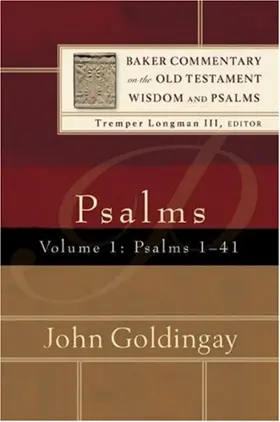

Psalms: Volume 1 (1–41)
in Baker Commentary on the Old Testament
Pages
640
Publisher
Baker Academic
Published
2006
ISBN-13
9780801027031
In this first volume of a three-volume commentary on the book of Psalms, Old Testament scholar John Goldingay provides a lucid introduction to the Psalter and fresh commentary on Psalms 1–41. Writing with a scholar's eye and a pastor's heart, Goldingay considers the literary, historical, and grammatical dimensions of the text as well as its theological implications. The resulting commentary will bring the Psalms to life for a new generation of students.
In addition to the commentary on Psalms 1–41, this volume contains Goldingay's introduction to the entire book of Psalms. This thorough introduction provides unique perspectives on matters such as the purpose of the Psalter, Psalms and history, poetry in the Psalms, the Psalms and worship, the Psalms and spirituality, and the Psalms and theology. Each chapter of the commentary proper contains the author's translation of a particular psalm, which shows in English some of the salient features of the Hebrew text. An interpretation of the psalm, section-by-section, follows. Also included is an extensive glossary section treating the vocabulary of Psalms 1–41 and noting how certain words are used to convey critical concepts.
In addition to the commentary on Psalms 1–41, this volume contains Goldingay's introduction to the entire book of Psalms. This thorough introduction provides unique perspectives on matters such as the purpose of the Psalter, Psalms and history, poetry in the Psalms, the Psalms and worship, the Psalms and spirituality, and the Psalms and theology. Each chapter of the commentary proper contains the author's translation of a particular psalm, which shows in English some of the salient features of the Hebrew text. An interpretation of the psalm, section-by-section, follows. Also included is an extensive glossary section treating the vocabulary of Psalms 1–41 and noting how certain words are used to convey critical concepts.
Reviews
This book, which was published in 2006, is the first of a planned three-volume commentary on the book of Psalms. The Baker Commentary series in which this work appears has a definite audience in mind. According to series editor Tremper Longman III, this audience consists of “scholars, ministers, seminary students, and Bible study leaders” (7–8). The editor further tells us in the series preface (7–9) that clergy and theological students are the primary target but that an attempt is made to make commentaries of the series accessible to nonscholars by putting most of the technical discussion and interaction with secondary literature in the footnotes. The reader can thus expect to find a scientific commentary, but one with a softer approach and with a focus on the message of the book of Psalms and on the message of each individual psalm. The reason why quotations from the Hebrew, Greek, and Aramaic are transcribed in the commentary must then probably also be sought in this attempt to expand the range of possible readers of the commentary. The author has also written a preface (11–13) in which he gives a schematized version of his modus operandi in writing the commentary. This reviewer is particularly grateful for the notes he makes there and regards this honest glimpse into his private life as an invaluable aid to understanding the features and contents of the commentary.
[Full Review]
